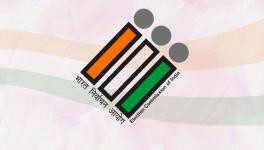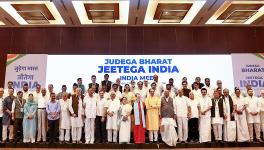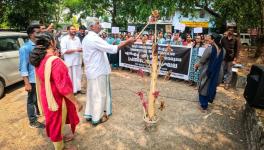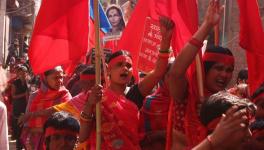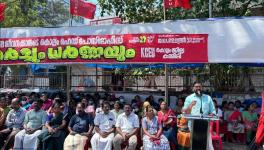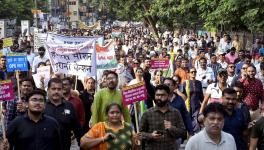Scheme Workers: Nightingales Subsidising Govt's Welfare Programmes
The 45th Session of the Indian Labour Conference was recently held in New Delhi on May 17-18. Among other things, it recommended minimum wages for workers employed in central government schemes such as Anganwadi, Mid Day Meal and ASHA and recognising them as "workers" instead of “volunteers”.
Newsclick speaks to Dr. K. Hemalata, National Secretary of the Centre of Indian Trade Unions on the working conditions of the scheme workers and their role in the Social Welfare Programmes of the Government of India.
Transcript
GM: Hello and welcome to Newsclick. The 45th session of the Indian Labor Conference was recently held in Delhi. It had discussed the issues concerning scheme workers and had suggested certain recommendations. To discusses on these, today we have with us Dr. K. Hemlata, National Secretary of the Centre of the Indian Trade Unions. Welcome Ma’am.
Could you please tell us what the discussions have been on the issues of the scheme workers, and what are the recommendations?
KH: The 45th session of the Indian Labor Conference for the first time discussed the conditions of work of the scheme workers. There are around once crore such scheme workers, and the national-- this ILC-- they have discussed, and it was recommended that the scheme workers should be recognized as workers; they should be provided minimum wages, social security benefits, including pension, and the should have the right to organize and collective bargaining. These are the main recommendations of ILC, and all the trade unions unanimously argued for this. Their state governments also agreed for that. And only the Women and Child Development Ministry and the representatives of the Education Ministry, they had some reservations on providing minimum wages, on recognizing them as workersm and providing them pension, but all were unanimous that their conditions needs to be improved.
GM: Who are these scheme workers, and what is the work that they do?
KM: Actually there are two aspects. The governments since-- during the last-- around two decades or so have been starting many schemes. You may start schemes to address certain problems of the people, but the trend is that to provide the basic needs of the people in education, health, or food, nutrition, etc., which are very much necessary for the development-- human development of our country. In these areas the government is starting schemes. So on one way (hand), the government is not providing the services to the people as entitlements, as rights to the people. Instead of providing them as rights, they are starting schemes, which can be closed at any time as temporary measures. And on the other hand, they are also not providing adequate financial resources for these schemes. So, you see, the Integrated Child Development Services Scheme-- it is a scheme which provides for the development of children ― the supplementary nutrition, healthcare, pre-school education, etc. for the holistic development of the children of the country. It's not a temporary measure, it's a permanent, as long as children are there in our country, they require these services. But instead of providing them as entitlements, the government had started the scheme in 1975, and till now, it is more than 37 years, it is continuing as a scheme. And today around 27 lakh workers are working in these schemes, in this ICD scheme, and many of them are working since the last-- more than 30 years. So, on the one hand, the people are being cheated ― that we are doing so many things, it’s a flagship program, we are spending-- all these things. On the other hand, the workers who are working in these schemes, they are not even recognized as workers. Those... all of them are women. In ISDS, the “anganwadi” workers and helpers, all of them are women. So these women and workers are not recognized as workers. They are called social workers, and they are provided a honorarium. It’s very meager. The workers are provided 3000 (rupees) per month by the central government; the helpers are provided 1500 (rupees) per month, and-- which is only a fraction of their minimum wages. They are working as skilled workers. They are provided training, and they are working as skilled workers.
And now the other scheme ― National Rural Health Mission that was started in 2005. That also addresses the main concerns of health, particularly [for] women in the rural areas. Around eight and a half lakh women are working as “ASHAs.” “ASHAs” is Accredited Social Health Activists. So they are not even called social workers, they are called activists. Government gives a long list of jobs which they have to do, and they say they need not be paid anything because while doing their regular activities they can do this things also, which is not possible because they have to take the pregnant women, to conduct the survey, identify the pregnant women, ensure that they receive health check ups, immunization, etc., and also encourage they receive institutional delivery. When the pain starts they have to take them, accompany them to the hospital. All these things. So even if is the midnight, they have to take the women to the hospital. Despite that, they are only called activist, and they are not even paid honorarium like the “anganwadi” workers.
GM: Not a single paisa.
KH: No, no. “Anganwadi” workers-- they are atleast paid some honorarium, a fixed amount. But the “ASHAs,” they are not paid honorarium, and they are paid an incentive that is a piece rate. If you perform this-- if so many women are immunized, then you get something. If so many persons are opting for family planning methods, then you get something. If so many women are taken for institutional delivery per women, they get something. So there is no fixed amount that they receive.
And then, the mid day meal workers. That's also another flagship programme of the central government. And that was started in 1996, and modified several times. Now it is widen, spread, and around 26 lakh workers are working as cooks and helpers under this mid day meal programme. Till 2009, they were not paid anything. Only per child allocation was there, and 40 paisa per child, they were getting. And since 2009, the government has fixed 1000 rupees Per cook and worker. But even that is not paid throughout the year-- only for 10 months, and during the holidays, they are not paid. And in some states it is not implemented properly. It is divided into (between) two persons, 500-500, 600-400 like that. That is the mid day meal workers. And they don't get any other benefit. No other benefits. Neither pension nor health benefits, nor paid leaves. Nothing. And now, another interesting thing is [that] because of this “ASHAs,” the number of institutional deliveries has (have) increased. The government itself has acknowledged that. Recently, there was an advertisement that they are backbones. Everybody praises them. But to meet the situation what needs to be done is to increase the number of nurses, etc.-- health personnels in the hospitals. Instead of doing that, the government has entered into an agreement with the Netherlands government, and they have started another another initiative which is called “Yashoda.”
GM: Very fancy names they give.
KH: “Yashoda” and “Mamatha.” So they are trained for a few days and appointed in the hospitals round the clock in shifts all the 24 hours, and they do all the jobs that a regular nurse does except giving medicines, but they are paid only a consolidated amount of 3000 rupees per month. And after three years, 20% of the “Yashodas” will be replaced. So after working for 3 years that particular “Yashoda” will be removed, and another “Yashoda” will come. So these are the different types of things.
Similarly under the “Sarva Shiksha Abhiyan,” another flagship programme of the government of India, regular teachers are not been employed. Para teachers-- they do the same thing, same teaching, but they are only paid a consolidated amount. So we had made a rough estimate of all the different-- there are several other schemes of the central government-- like in agriculture, there is an “ATMA” scheme-- what is that-- some techinical-- Agriculture Technical Management Agency scheme. And around 6 la-- 3 lakhs workers are doing that. The same job earlier, before 1990s the extension workers were there in villages, now they are removed and these are-- they are named “Krishak Saathis,” “Raitu Mitras,” in different states, different names. So like that, in different schemes about 1 crore workers are working today. So the major thing is these workers are denied. Just to deny them the minimum wages and other associated benefits the governemnt is calling them in fancy names denying them the status of the workers.
GM: The Prime Minister says that these workers are the pillars of social and human development in our country. Yet he says to pay them minimum wages, and to recognise them he has financial constraints, especially due to the economic downturn and all that we are witnessing. How far is it true?
KH: The CITU has made some efforts to organize all these sections, to unite all these sections. And [on] 26-27 [of] November last year, we organised a very big “Mahapadav,” and then made a representation to the Prime Minister when he made the remarks that they are contributing to the human development of our country, and they are the pillars ― the “anganwadi” workers, the “ASHAs,” Mid Day Meal workers, etc. but the point is he says that we don't have the money. He'll discuss with the finance minister, and he says that all your demands are justified ― your demand for minimum wages is justified, your demand for pension is justified, and earlier, when “anganwadi” workers and helpers met him, he said that we will pay them some parting gift because after 30 years, they are being retired. They are not recognized as workers, but they are being retired. Now they say it is called “disengagement” because if you are retired, then you have to pay something. It is disengagement. He said we will give you some parting gift, not pension or gratuity, some parting gift. Okay. We said give them. But till now, since 2006 [to] 2013, nothing is given, and the main reason is financial constraints. So every year in the budget, the government is providing different types of concessions and incentives to the big corporates, which amount to approximately five lakh crores each year. So even if these workers are recognized-- all the one crore workers are recognized and paid ten thousand rupees per month as the trade unions are demanding that minimum wages any worker should be ten thousand rupees per month. Even if they are paid this amount, it will be around one lakh crores so per year. So every year five lakh crores government is providing incentives to the big corporate houses, but they are not able to provide even a small part of the amount to these workers who are contributing to the development of our country. In many-- Many studies have found were the “anganwadi” centres are there the immunization level has increased; the malnutrition, upto some extent, has decreased; school enrolment has increased; school drop out has decreased, all these things are there. Similarly, the mid day meal programme. Now the “ASHA,” all these proven indicators are there, but instead of increasing allocation of these schemes, what the government is doing is that the allocation is not increased. Allocations for these schemes are not adequate, and the workers are also not provided the minimum wages and other benefits.
GM: Most of these scheme workers are women. An overwhelming majority are (is) women. How is their status in the society changed with their involvement in such schemes, with the work they do.
KH: Actually, wherever they are working, they do get recognition. Though their payment is very low, we find, in many places, the “anganwadi” workers and helpers, because they have access to the women particularly, and they go their houses, and they advise them on many aspects. There is a very good relationship... and there is a recognition of their services. Similarly about “ASHAs” also. And on many other questions also, they come and talk to them. And I feel because of that they are doing actually. There are problems definitely. Because they are women, they are low paid. And particularly another thing is that many of them come from socially backward sections... many of them... because the criterion for selection of “anganwadi” workers and helpers and “ASHAs” is that they have to be selected from the community. So they do come from the socially backward sections. They face many of these problems. But still in many places, actually they are the ones who are subsidising the government and implementing these programmes.
GM: Exactly, which is the irony. Instead of government paying them, they are subsiding the government.
KH: ...And they do get some satisfaction. We asked the mid day meal workers, how are you providing because they don't get even (don't even get) paid for that. They have to spend from their pockets or they get loan from the shops there to buy the vegetables and other things which are required. The government provides only the rice, etc. from the fair price shops. But other things, they have to buy. But... And for five months, six months they are not reimbursed. But still... Because they feel we are feeding our own children in our own village. So how can we not feed them. So similarly, the “ASHAs.” Even [at] midnight when they get a call from some pregnant women that she is in labour and she has to be accompanied. She (ASHAs) leaves their own children and accompanies to the hospital the pregnant women-- where they don't even have a place to rest, and they are ill treated by the regular staff of the hospital, but still they are doing that. So it is a sort of commitment that they feel some satisfaction in doing their job.
GM: Do they have security of...? I mean is there hire and fire? How is it?
KH: Basically, to deny them job security, the government is resorting to this practice. So even after working for thirty years, the “anganwadi” workers and helpers, they don't have any job security. No other segment of these workers of job security. Now, the government is trying to privatize all these I.e. ICDS in the name of strengthening. ICDS mission – the prime minister has announced two years back (ago) that because malnutrition is a very big problem in our country, we have to look beyond ICDS. So instead of providing adequate resources to ICDS, now in the name of going... looking beyond ICDS and also stregthening ICDS, what the governemnt is trying to do is to privatize it. Now, it has taken a policy decision at least 10 per cent of the “anganwadi” ICDS project must be handed over to NGOs.
And then, the pre school education component-- they are encouraging nursery schools, private nursery schools. So where there is an anganwadi centre, just in the vicinity somebody is encouraged to establish a private pre-school, nursery centre or pre-primary school. They are provided incentives. So the children are withdrawn from the “anganwadi” centres and sent there. And different departments like the rural development department, etc. they are establishing nutrition centres in the vicinity of the “anganwadi” centres. So the work of the “anganwadi” centres are [is] being weakened and ICDS is weakened, and the “anganwadi” workers are told that if certain number of children are not there, then you will be removed from service.
Similarly, the mid day meal programme also. They are trying to handover the work of cooking to corporate NGOs like Vedanta-- they have set up one. Then this Nandi Foundation, ISKON, Akshaypatra. They collect foreign funds. They take money from the government and they collect donations, and they have very big kitchens where around two lakh meals could be cooked at the same time. So from there they say will supply meals to the schools. So the mid day workers are being removed from service. So they don't have any job security.
In addition to that, they don't have security as women at the work place also. We have many instances of “anganwadi” workers and helpers being attacked while doing their job. A few years back in Madhya Pradesh, a supervisor, an ICDS supervisor who was trying to prevent child marriage, her hands were chopped off. We have the case of Rajasthan, Bhanwari Devei. She is not an anganwadi worker, but working in this type of work. And similarly in many other places also. One “anganwadi” worker was killed in Orissa by some people, suspecting that she was a police informer. They were ivory...
GM: Mafia.
KH: ...mafia, so they killed the anganwadi worker there. And in many places because the infrastructure is not good. The anganwadi centres don't have pakka buildings. Cases have been reported where the roof has collapsed. Children are injured. Children died. And the anganwadi workers and helpers services are removed. And in some places, the political... when they are handed over the panchayats, the panchayat's representatives whether it is the president or the relatives, they are forcing the anganwadi workers. Sexual harrassment is there. Forcing to work in their homes also. So very different types of problems they face at their work place which the government does not address at all.
GM: What do you think should be the way out of this?
KH: Recommendation by ILC is a small step. The trade unions have been organizing since many years. And because of the struggles by the trade unions, some benefits they have achieved, whether it is 1000 rupees for the mid-day meal workers, small benefits for the “ASHAs,” and the remuneration, which was only 225 (rupees) per worker and 110 for the helpers in 1992. And even a few years back (ago), it was only 500 (rupees). Now it is 3000 (rupees). Even this meager increase in the remuneration... all these things have been achieved through the struggles of these workers. And because of that, that was reflected in the ILC recommendation. So what we think is that taking this, utilizing this recommendation of the ILC, the trade unions have to step up their pressure because there are many recommendations of the ILC which the government has not implemented. In the 15th Labour Conference i.e. way back in 1957, the ILC has (had) recommended need-based minimum wages, and they have (had) fixed some criteria. Till now, it is not recommended (implemented). And the 44th session last year, that also has recommended that the 15th ILC criterion should be taken to fix the minimum wages. It was a unanimous recommendation of the ILC, but this year the prime minister comes and he says that the government is considering fixing a floor-level minimum wage. The minimum wage is itself minimum.
GM: Floor-level.
KH: Minimum... and now it goes beyond. And floor-level minimum wage. And we don't know whether “paathaala” minimum wage also they will fix. But that the attitude of the government. So to address this, the way forward is only for the trade unions to unite and fight for the workers, and today they have achieved unity. All the 11 trade unions are fighting together on 10 basic points, so we... I think the way forward is to continue this struggle.
GM: Thank you for sharing your views with us.
Get the latest reports & analysis with people's perspective on Protests, movements & deep analytical videos, discussions of the current affairs in your Telegram app. Subscribe to NewsClick's Telegram channel & get Real-Time updates on stories, as they get published on our website.









